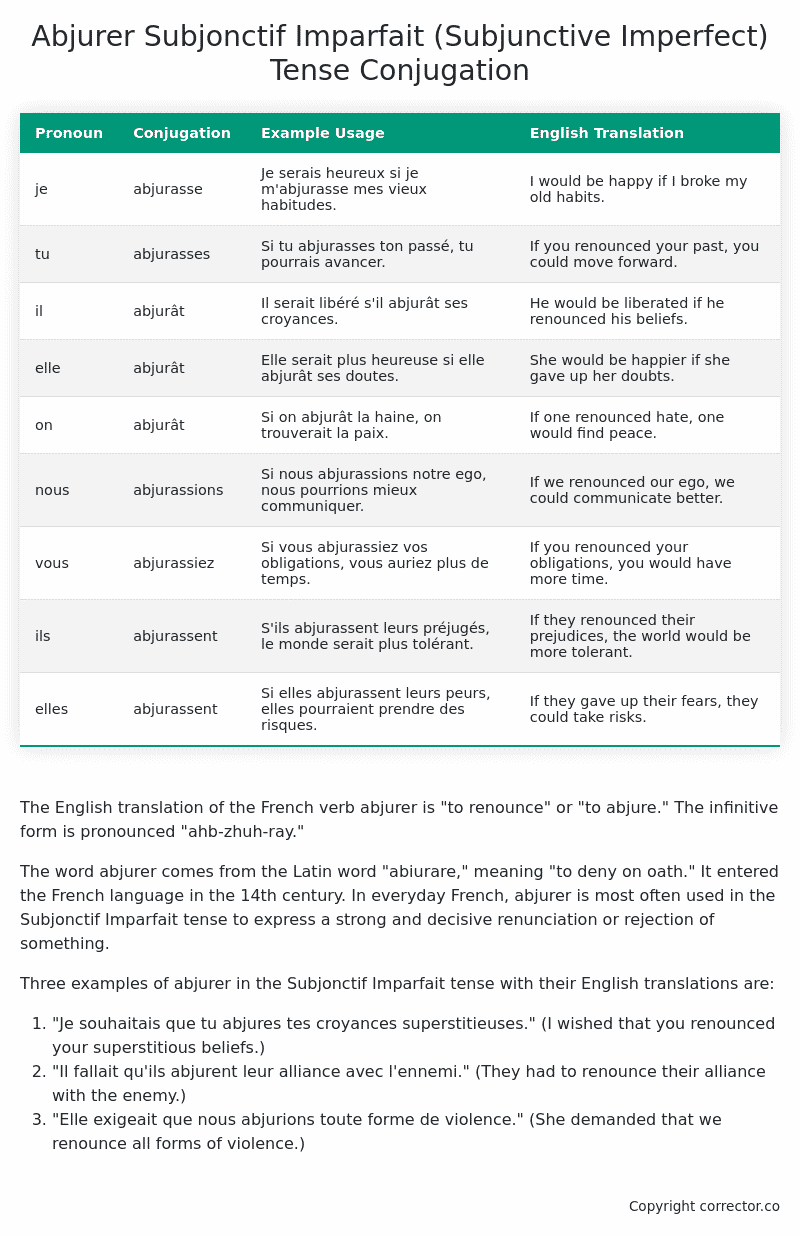Subjonctif Imparfait (Subjunctive Imperfect) Tense Conjugation of the French Verb abjurer
Introduction to the verb abjurer
The English translation of the French verb abjurer is “to renounce” or “to abjure.” The infinitive form is pronounced “ahb-zhuh-ray.”
The word abjurer comes from the Latin word “abiurare,” meaning “to deny on oath.” It entered the French language in the 14th century. In everyday French, abjurer is most often used in the Subjonctif Imparfait tense to express a strong and decisive renunciation or rejection of something.
Three examples of abjurer in the Subjonctif Imparfait tense with their English translations are:
- “Je souhaitais que tu abjures tes croyances superstitieuses.” (I wished that you renounced your superstitious beliefs.)
- “Il fallait qu’ils abjurent leur alliance avec l’ennemi.” (They had to renounce their alliance with the enemy.)
- “Elle exigeait que nous abjurions toute forme de violence.” (She demanded that we renounce all forms of violence.)
Table of the Subjonctif Imparfait (Subjunctive Imperfect) Tense Conjugation of abjurer
| Pronoun | Conjugation | Example Usage | English Translation |
|---|---|---|---|
| je | abjurasse | Je serais heureux si je m’abjurasse mes vieux habitudes. | I would be happy if I broke my old habits. |
| tu | abjurasses | Si tu abjurasses ton passé, tu pourrais avancer. | If you renounced your past, you could move forward. |
| il | abjurât | Il serait libéré s’il abjurât ses croyances. | He would be liberated if he renounced his beliefs. |
| elle | abjurât | Elle serait plus heureuse si elle abjurât ses doutes. | She would be happier if she gave up her doubts. |
| on | abjurât | Si on abjurât la haine, on trouverait la paix. | If one renounced hate, one would find peace. |
| nous | abjurassions | Si nous abjurassions notre ego, nous pourrions mieux communiquer. | If we renounced our ego, we could communicate better. |
| vous | abjurassiez | Si vous abjurassiez vos obligations, vous auriez plus de temps. | If you renounced your obligations, you would have more time. |
| ils | abjurassent | S’ils abjurassent leurs préjugés, le monde serait plus tolérant. | If they renounced their prejudices, the world would be more tolerant. |
| elles | abjurassent | Si elles abjurassent leurs peurs, elles pourraient prendre des risques. | If they gave up their fears, they could take risks. |
Other Conjugations for Abjurer.
Le Present (Present Tense) Conjugation of the French Verb abjurer
Imparfait (Imperfect) Tense Conjugation of the French Verb abjurer
Passé Simple (Simple Past) Tense Conjugation of the French Verb abjurer
Passé Composé (Present Perfect) Tense Conjugation of the French Verb abjurer
Futur Simple (Simple Future) Tense Conjugation of the French Verb abjurer
Futur Proche (Near Future) Tense Conjugation of the French Verb abjurer
Plus-que-parfait (Pluperfect) Tense Conjugation of the French Verb abjurer
Passé Antérieur (Past Anterior) Tense Conjugation of the French Verb abjurer
Futur Antérieur (Future Anterior) Tense Conjugation of the French Verb abjurer
Subjonctif Présent (Subjunctive Present) Tense Conjugation of the French Verb abjurer
Subjonctif Passé (Subjunctive Past) Tense Conjugation of the French Verb abjurer
Subjonctif Imparfait (Subjunctive Imperfect) Tense Conjugation of the French Verb abjurer (this article)
Subjonctif Plus-que-parfait (Subjunctive Pluperfect) Tense Conjugation of the French Verb abjurer
Conditionnel Présent (Conditional Present) Tense Conjugation of the French Verb abjurer
Conditionnel Passé (Conditional Past) Tense Conjugation of the French Verb abjurer
L’impératif Présent (Imperative Present) Tense Conjugation of the French Verb abjurer
L’infinitif Présent (Infinitive Present) Tense Conjugation of the French Verb abjurer
Struggling with French verbs or the language in general? Why not use our free French Grammar Checker – no registration required!
Get a FREE Download Study Sheet of this Conjugation 🔥
Simply right click the image below, click “save image” and get your free reference for the abjurer Subjonctif Imparfait tense conjugation!

Abjurer – About the French Subjonctif Imparfait (Subjunctive Imperfect) Tense
Formation
Common Everyday Usage Patterns
Interactions with Other Tenses
Subjonctif Présent
Indicatif Passé Composé
Conditional
Conditional Perfect
Summary
I hope you enjoyed this article on the verb abjurer. Still in a learning mood? Check out another TOTALLY random French verb conjugation!


